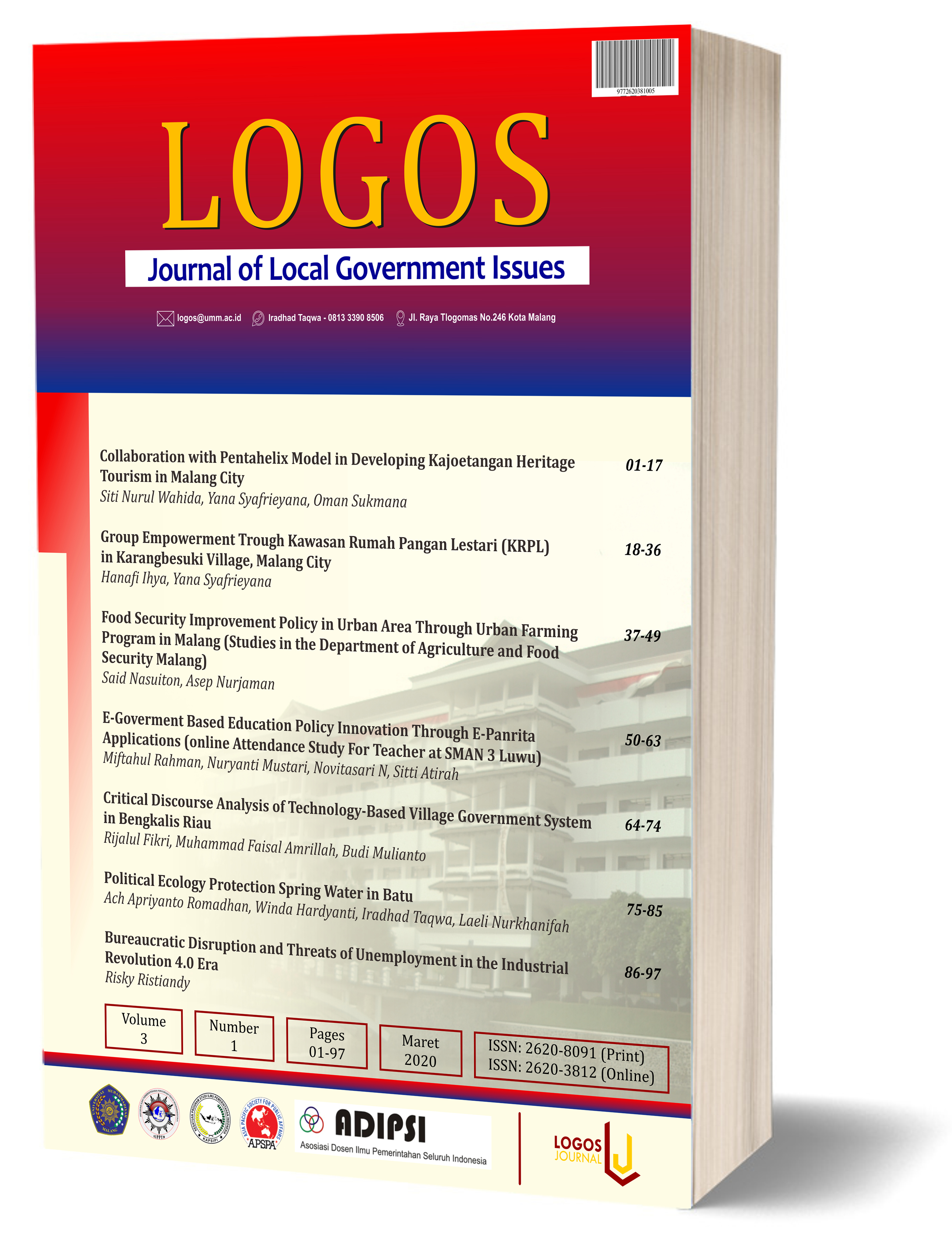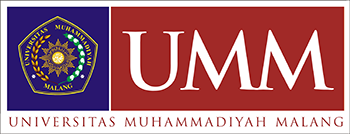Food Security Improvement Policy in Urban Area Through Urban Farming Program in Malang (Studies in the Department of Agriculture and Food Security Malang)
DOI:
https://doi.org/10.22219/logos.v3i1.11100Keywords:
food security, malang city, urban farmingAbstract
Food security is inseparable from the factors of availability, quality, and affordability of food, where a country can assure the food needs of society ranging from families to individuals. This is mentioned in the latest Law number 18 of 2012 on Food, which states that food security includes the availability of food in quantity, quality, and affordability that aim to create a healthy, productive, and sustainable life. This paper discusses the extent to which the urban farming program as one of the government programs influences the community to achieve food security, especially family food needs. This research was conducted in several villages in five sub-districts of Malang, namely Klojen, Suku, Lowokwaru, Blimbing, and Kedungkandang. The research method used in this paper is qualitative descriptive. The primary data were collected through interviews and field observations, while the secondary data were collected through literature and documentation study. From the research conducted, the results show that this urban farming program influences several points about food security, especially those mentioned in Law number 18 of 2012, including availability, quality, and affordability. In addition, the research revealed that some locations are less able to develop urban farming programs effectively, due to the lack of supervision, socialization, and technical guidance.
Downloads
References
Bailkey, M., & Nasr, J. (1999). From brownfields to Greenfields: Producing Food in North American Cities. Community Food Security News, Fall, 2000, 6Bairwa.
Belinda, N., & Rahmawati, D. (2017). Pengembangan Urban Farming Berdasarkan Preferensi Masyarakat Kecamatan Semampir Kota Surabaya. Jurnal Teknik ITS, 6(2), C165-C168.
Disyacitta, F. (2018). Urban Farming sebagai Gerakan Sosial Baru Kelas Menengah: Studi Kasus di Surabaya. Tesis: Universitas Gadjah Mada.
Fauzi, A. R., Ichniarsyah, A. N., & Agustin, H. (2016). Pertanian Perkotaan: Urgensi, Peranan, dan Praktik Terbaik. Jurnal Agroteknologi, 10(01), 49-62.
Heryanah, H. (2016). Ketahanan Pangan Rumah Tangga Di Jawa Barat: Analisis Data Susenas 2012. Populasi, 24(2), 80-99.
Kurniasih, M. (2015). Implementasi Program Urban Farming Sebagai Strategi Pembangunan Ketahanan Pangan Perkotaan (Studi Di Kelurahan Made, Kecamatan Sambikerep, Kota Surabaya). Tesis: Universitas Brawijaya.
Santoso, E. B., & Widya, R. R. (2014). Gerakan Pertanian Perkotaan Dalam Mendukung Kemandirian Masyarakat di Kota Surabaya. Seminar Nasional Cities
Setiawan, B., & Rahmi, D. H. (2004). Ketahanan Pangan, Lapangan Kerja, dan Keberlaniutan Kota: Studi Pertanian Kota di Enam Kota Indonesia. Warta Penelitian, (5).
Shobry, M. N. (2016). Faktor yang Mempengaruhi Keberhasilan Pelaksanaan Program Urban Farming di Kabupaten Gresik. Tesis: Universitas Airlangga.
Sihgiyanti, V. J. (2016). Evaluasi Implementasi Program Urban Farming Oleh Dinas Pertanian Di Kota Surabaya. Jurnal Kebijakan dan Manajemen Konflik, 4(2), 264-272.
Widyawati, N. (2013). Urban Farming, Gaya Bertani Spesifik Kota. Yogyakarta: Lily Publisher.
Regulation
Undang-Undang Nomor 18 Tahun 2012 tentang Pangan
Downloads
Published
How to Cite
Issue
Section
License
Copyright (c) 2020 Said Nasuiton, Asep Nurjaman

This work is licensed under a Creative Commons Attribution-ShareAlike 4.0 International License.
Authors who publish with this journal agree to the following terms:
- Authors retain copyright and grant the journal right of first publication with the work simultaneously licensed under a Creative Commons Attribution-ShareAlike 4.0 International License. that allows others to share the work with an acknowledgment of the work's authorship and initial publication in this journal.
- Authors are able to enter into separate, additional contractual arrangements for the non-exclusive distribution of the journal's published version of the work (e.g., post it to an institutional repository or publish it in a book), with an acknowledgment of its initial publication in this journal.
- Authors are permitted and encouraged to post their work online (e.g., in institutional repositories or on their website) prior to and during the submission process, as it can lead to productive exchanges, as well as earlier and greater citation of published work (See The Effect of Open Access).

This work is licensed under a Creative Commons Attribution-ShareAlike 4.0 International License.













